Music reviews: Rammstein finds humor in the end times; Heart's Ann Wilson is still fierce

Maybe the apocalypse won’t be so bad.
It’ll be fine if it’s anything like Rammstein’s new “Zeit” – coated in bleakness, of course, but packed with cathartic rage, simmering with sex and loaded with humor.
The iconic German band relies on industrial-strength electric grooves (a trademark of the group for its near-30-year existence), more melodies than should be legal and ridiculous histrionics, emphasized by lead singer Till Lindemann’s booming voice and mastery of every harsh tone the German language affords. Don’t miss how he coarsely rolls his “Rs” on the plow-driving “Giftig” (“Toxic”).
“Zeit” is absurdly juvenile at times, as guilty pleasures often are, however it’s almost relentlessly engaging.
Opening cut “Armee der Tristen” (“Army of the Sad”) sets the tone, jabbing guitars leading a march of misery, though subsequently Rammstein zigs and zags gleefully through the end times of “Zeit.” The title track embraces mortality as an acceptable inevitability, its soft tones sailing off into a gallop, and the careening “OK” intertwines lust and romance while “Angst” simply pummels the atmosphere with crushing doom.
Then there’s the playful, and biting, send-up of body modification that is “Zick Zack” – oddly contrasted by a later droll track about Lindermann’s one desired trait for a mate: an ample bosom. There’s also peculiar intrigue in the drama about an adult man and his abusive mom (“Meine Tranen”) and the uneasy lullaby where lies meet idealism (“Lugen”).
Fittingly, “Zeit” comes down to the finality of death on closing track “Adieu,” where Lindemann promises to be there at the end, singing one last time.
That sure beats dying alone.
Rammstein
"Zeit"
Rating: 4 (out of 5)
++++++++++
Heart's Ann Wilson is still feeling fierce
A cynic might wonder if artists simply run out of things to say as they get older, but it stands to reason that the more life experience we accumulate, the more tales and observations we’ll have to share.
So while the world in general and the music industry in specific have greatly changed since Heart frontwoman Ann Wilson was a queen of rock during her Seattle band’s heyday in the 1970s and 1980s, Wilson’s life didn’t go into limbo when the hits stopped coming. And she sounds as confident as ever on her new, aptly titled “Fierce Bliss,” which a press statement teases as “classic rock comfort food.”
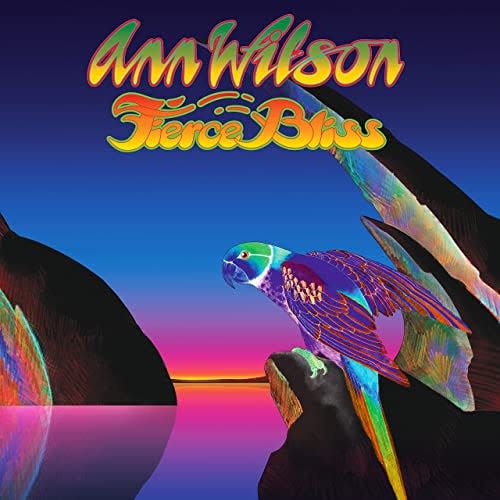
That said, the release defies modern conventions that call for tight track editing – fully five of the 11 songs are 5 minutes or longer, and they tend to feel even longer than that in their meandering guitar-fueled stretches. However, it’s fair to note that Kenny Wayne Shepherd’s searing work as lead guitarist on a cover of Robin Trower’s “Bridge of Sighs,” as well as his contribution to Wilson’s unexpected cover of Eurythmics’ “Missionary Man,” stand out.
As for Wilson, she’s gutsy in the in the hard-driving rock opener “Greed” (even if her assertion that greed is bad is hardly enlightening) and she brings an element of timeless class to closing ballad “As the World Turns.” And naturally she embraces the femme fatale theme of “Forget Her,” becoming one with the darkly ethereal atmosphere as she sings, “Don’t fool yourself, she was heartache from the moment that you met her.”
Although the periodic ponderous pacing diminishes both the intensity and joy of “Fierce Bliss,” and cheesy theatrics add a “filler” feeling to throwaway tracks like “Gladiator” and “Angel’s Blues,” Ann Wilson still has something to say. And she also still has the pipes to express herself.
Ann Wilson
"Fierce Bliss"
Rating: 3-1/2 (out of 5)
++++++++++
Love & Pain brings dark waves
Seattle’s Love & Pain weaves together key elements of some of the gloomier genres from over the years to create a mesmerizing bleak beauty in “It Comes in Waves.”
The EP is downbeat and gorgeous, lead vocalist Natalia Czajkiewicz evoking the ghost of a 1950s doo-wop vocalist and bringing a chill to the melodies as multi-instrumentalist Brad Clifford creates an atmosphere of cinematic otherworldliness, dark folk, Goth and shoegaze.
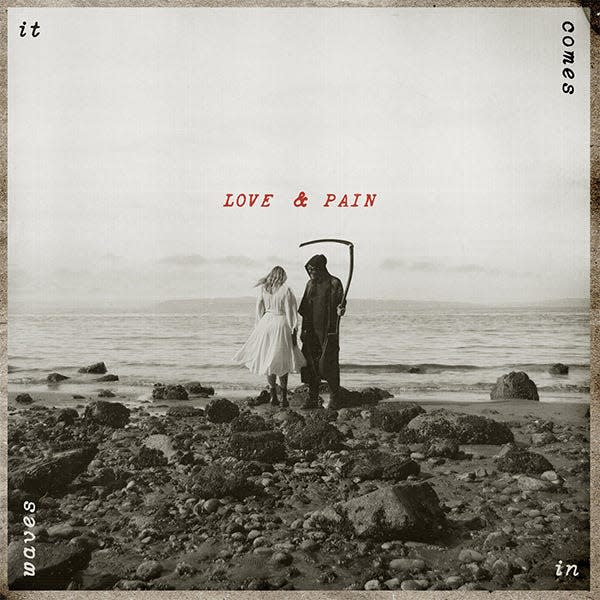
Love & Pain’s creepy hypno-pop underscores an odd blend of ethereal and raw strains on opening cut “Exit Scene,” powered by stark drums and divergent guitar, as well as the murder-ballad vibe of “Pleasure Is Overrated,” where Czajkiewicz sings, “I read your letter last night/Inked in blood on white/Cold breath in the moonlight … Nothing feels right when you’re gone.”
Later, she arcs her voice into a more emphatic delivery on “Time Doesn’t Heal a Thing,” dishing lines like, “It’s cold in the dark of your shadow,” while on closer “White Lilies” she sinks into what feels like a meditative dirge of a finale.
Yet Love & Pain best demonstrates its potential on the track “Deep Space,” cosmic effects and stray electricity cooling the atmosphere while the vocalist channels something of a classic French or perhaps Italian chanteuse, singing about “eyes in a crowded room” and announcing, “I’m not covered in mud/I’m not covered in blood/But still, I’ll do the ritual.”
“It Comes in Waves” treads familiar ground, but it’s masterfully executed and beautifully finessed.
Love & Pain
"It Comes in Waves"
Rating: 4 (out of 5)
++++++++++
Leandrul revamps 'Psychosis' songs
Leandrul creates an alternate universe with her new “Versions,” an EP that features revamped and repurposed tracks from her 2021 album “Psychosis of Dreams,” which itself was a concept piece that included first-person experience to raise awareness for mental health issues.
The Seattle-based performer is a natural to create a multi-verse because she has been living one the past few years: Crosby Morgan was a folk singer-songwriter before she flipped to become a home-based electronic-music performer, releasing her first electronic album under the name Leandrul in 2018.
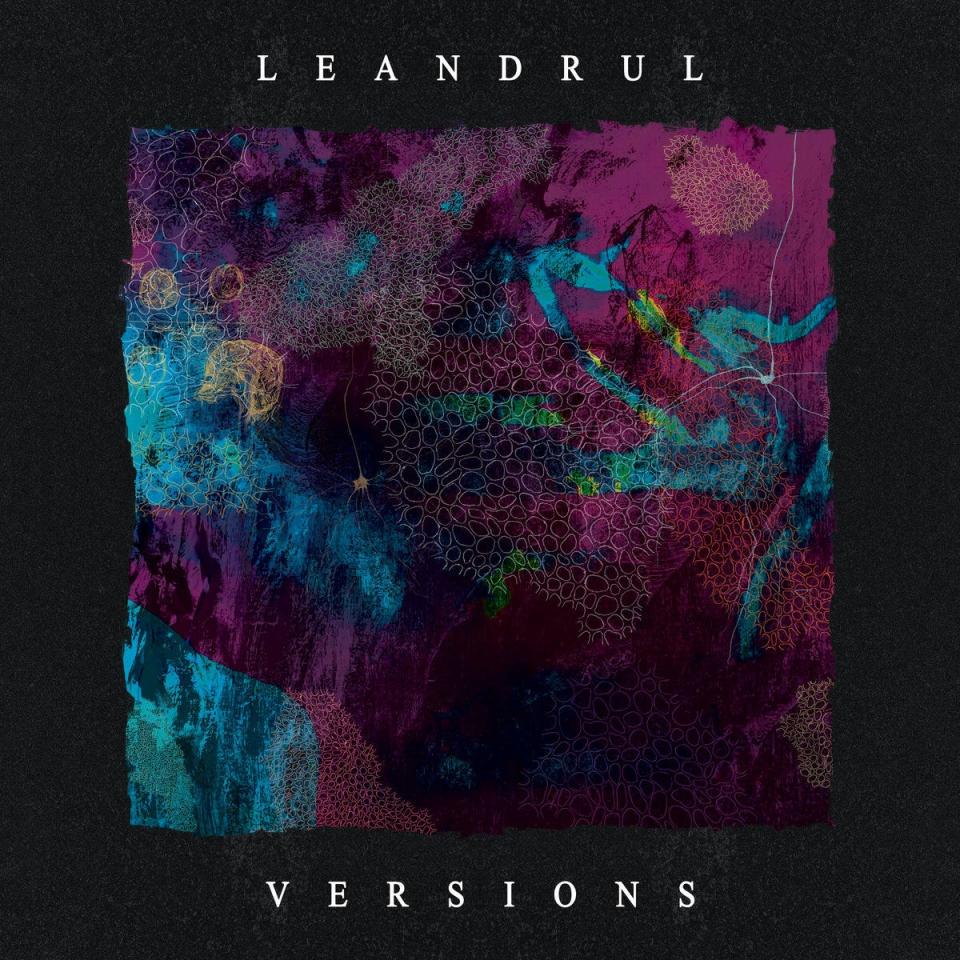
Folk-to-electronic isn’t the most natural transition for an artist, but Leandrul’s listeners can hear her folk roots through elements of her song construction and vocal delivery. They will also hear the original foundations of the “Versions” songs from their “Psychosis” days, though their revived presence on “Versions” feels loose and informal.
Her new “extended mix” version of “Broad Hall” tags on a couple of minutes to the original, the propulsive rhythm persevering over several layers of vocals that are untethered and floating through the atmosphere. Also, the “choir version” of “Interim” shifts from the more standard arrangement of the original to incorporate a striking build from minimalism to a magically dramatic choir-based midsection before resettling. And the “dance edit” of “Redemption” is hardly a club banger: It’s an offbeat flow of morphing electronics and a glitchy vocal arrangement.
Yet the most impressive track on “Versions” didn’t originate in “Psychosis”: “ILUV” is a dense creation with thumping and pulsing cadence as whimsical effects poke in the compressed air and downplayed vocals. By contrast, a Project 32 remix of the same song, also on “Versions,” is choppy and all over the place.
Leandrul’s base may be relatively small, but this EP will suit those who like folk-tinged experimental electronica.
Leandrul
"Versions"
Rating: 3-1/2 (out of 5)
++++++++++
Gooseberry is ripe with contrasts
Brooklyn-based indie quartet Gooseberry makes the most of its split personality on the new “Broken Dance,” undulating under the influence of dual songwriters/lead vocalists Asa Daniels and Sam Rappaport and snaking through fluid electricity with mesmerizing, if sometimes-chaotic, effect.
The band, which also includes drummer Evin Rossington and bass player Will Hammond, formed late in 2019 with barely enough time to get their act together before the pandemic derailed the music industry. Perhaps eventually Daniels and Rappaport will sound more unified working alongside each other – but why push it? John Lennon and Paul McCartney maintained their individuality through their run in the Beatles, after all.
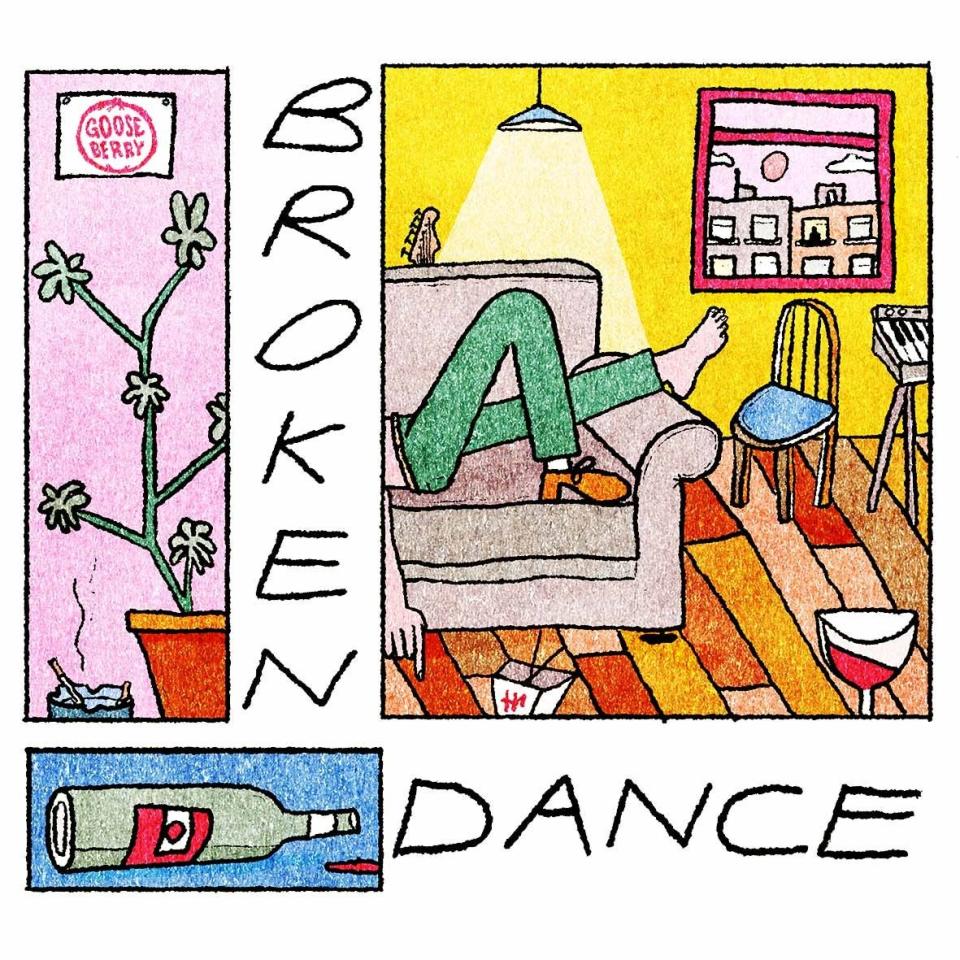
Although Gooseberry is no resurrected Fab Four, the “Broken Dance” EP is lively and flavorful.
Daniels kicks off the release with “Sleep,” agonizing in the creative limbo routinely faced by artistic sorts (particularly writers/songwriters): Sweet guitar and slapping rhythm escort him through the first minute or so as he declares, “I just want to shut my mind off,” and the song subsequently whips into a bluster of stop-and-start buzzing rock, underscoring the frustration of Daniels in a hypnotic whirl. Rappaport follows with the “Broken Dance” title track that explores how relationships are often collateral damage for ambitious (and self-serving) artists as the arrangement builds from a foundation of violin and piano into an explosive classic rock sound.
The contrasts continue, blues working into the jazz framework of the Jamiroquai-like pop foundation of “Only One” that eventually plugs into a high-voltage eruption, and “Living to Die” closing out the EP with raucous horn-laced philosophy about the futility of existence.
Life is complicated, so it’s only fitting that songs about living should be complex.
Gooseberry
"Broken Dance"
Rating: 4 (out of 5)
++++++++++
Chelsea Jade hits hard with 'Soft Spot'
Cheslea Jade’s “Soft Spot” is a deceptively brilliant pop album.
It’s unapologetically pop yet superbly crafted, wrapped in modern production while also conjuring some of the best pop releases of long ago, from the top Prince proteges of the 1980s to 1990s-era Janet Jackson.
Meanwhile, “Soft Spot” is both maxed out on primal motivations – think: Madonna’s 1992 release “Erotica” – and surprisingly intellectual, as Jade dissects, analyzes and discards the very emotions that hold her hostage.

“Soft Spot” is a dual-purpose aural wink, to earnestly hit on you and also to warn you not to fall for it.
Her voice is an all-encompassing swirl of breathy ethereality against the enticing R&B of “Optimist,” where she teases with, “I became an optimist the minute that we touched/I’m almost positive it’s love.”
But don’t let down your guard.
An elevated-heartrate cadence on “Superfan” emphasizes the internal intensity of infatuation as she reveals, “I only bully you when I’m in a giving mood/Like, I like you, but I like when you’re uncomfortable, too.” Also, against the rhythmic suggestiveness of “Best Behaviour” she offers, “Cut my hair above the shoulder so no one could hold me back,” and she dovetails with the loopy funk of “Big Spill” (“You contradict your appeal, and my affection for you wanes”) and is electrified in reverb on “Good Taste” (“I know we’re just meeting, but feel me up with feeling”).
As satisfying as her vocals and the grooves are, her challenging lyrics are the most rewarding, whether it’s “Honey, if you’re gonna to have a tantrum, let’s do it in duet” (on “Tantrum in Duet”) or this zinger from closing track “Night Swimmer”: “Oh, you’ve got nothing on me/Except your body.”
Chelsea Jade might have been groundbreaking in the 1980s, but let’s be glad we have her in 2022.
Chelsea Jade
"Soft Spot"
Rating: 4-1/2 (out of 5)
++++++++++
Ekko The Strange taps in to mystique
The target demographic for Ekko The Strange’s “Mystique” is those who like to groove with horror-film soundtracks, whether that means dancing or driving or just hanging out.
Beyond that, Ekko aims at fans of various subgenres of electronic music – be that something as mainstream-adjacent as classic techno and Goth or something a bit deeper and more elusive, like darkwave and synthwave.

And then the Idaho-native, Poland-based Ekko goes a step further with highly dramatic, otherworldly vocals – generally conjured in the background as if a reluctant and angry soul had been hijacked and stirred into the mix. Those vocals (which are more rasped and whispered than sung) are mostly used as a supportive nuance to add an ominous air to the propelling tracks, though some listeners will find them too cheesy to endure.
Otherwise, “Mystique” weaves its magic, a Halloween-friendly soundtrack built on propulsive insistence and also an unorthodox outlier to conventional 2022 dance music. It’s quaintly retro, but not really anachronistic, as it dredges up the industrial-dance spirits of the likes of 1980s-born acts like Nitzer Ebb and Front 242.
The track “Vamps” is an unholy alliance of dissonance and darkness, naturally irresistible rhythms filtered through unnatural processing and effects reminiscent of old sci-fi flicks and alternate-reality radio transmissions. Likewise, menace and allure are married to a heartbeat-like pulse in “Exotic,” “Reanimate” is a journey in metamorphosis, and the chaotic nightmare-scape “Gleboki” (named for a Polish village) seems to beckon for escape.
Sure, this excursion into a foreboding realm comes with a passenger – those histrionic vocals that are about as welcome as a bratty kid brother in the back seat on a cross-country trip. Yet they eventually meld into the scenery and become easy to ignore.
Ekko The Strange
"Mystique"
Rating: 4 (out of 5)
++++++++++
Moonalice shines with charm
Moonalice is a 10-piece Northern California collective of musicians who specialize in a psychedelic soul sound pioneered in the 1960s with help from its now-octogenarian harmonica player, Lester Chambers.
The act’s new “Full Moonalice Vol. 1” is a sweaty, earthy jam loaded with the passion and confidence of a band of veterans having a good time and concentrating on mood over than precision. It’s a liberating listen, rooted in Americana and elevated by the spiritualizing effects of gospel nuance.
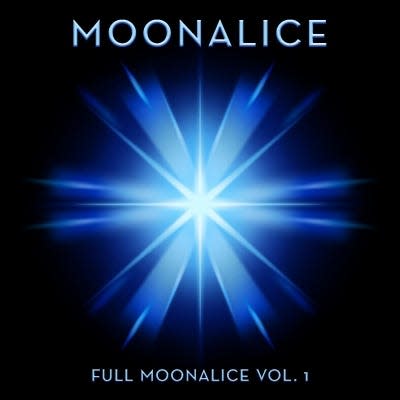
Dylan Chambers, son of Lester, is lead vocalist on kinetic first track “Turn on Your Love Light,” a rich-grooved cover of Bobby “Blue” Bland, the younger Chambers singing “Let it shine! … Come on baby!” and an instrument-focused revolving spotlight making the rounds until a denouement that sounds like a raucous revival.
The group’s T Sisters (an Americana trio on their own) steal the thunder on the subsequent “Woo Woo,” echoing a classic vocal group as they dish exhilarating lines like, “I’m feeling so good today/I’m finally on my way.”
“Full Moonalice” is infectious with its charm and enthusiasm, yet it invites distraction as it wears on. Listeners will find themselves tapping out once the release gets mired in the slow-rock “People Get Ready,” the jamming blur of “Let’s Get Funky” (which at least packs a lusty wallop) and the cheesy country strains of “Nick of Time.”
It’s especially hard to withstand the near-10-minute extended version of “Time Has Come Today,” the arrangement’s ragged swirl charred by enervating electricity and an evasive finale.
Best listening strategy: Give “Full Moonalice” your full attention for 10 or 15 minutes, and then find something else to do when the music shifts to something more suitable as background noise.
Moonalice
"Full Moonalice Vol. 1"
Rating: 3-1/2 (out of 5)
++++++++++
Grae's lyrics give 'Whiplash' power
Canadian singer-songwriter Grae’s new “Whiplash” will strike a chord with those who take heart in the confessions of an introspective and soft-spoken vocalist.
The Toronto performer’s reflections are bathed in sadness yet tinged with hope and humor, and the songs are adrift in the surreal atmosphere of dreampop.
Words are everything here, and Grae dishes out lines that will hit home with listeners, particularly the moody ones.
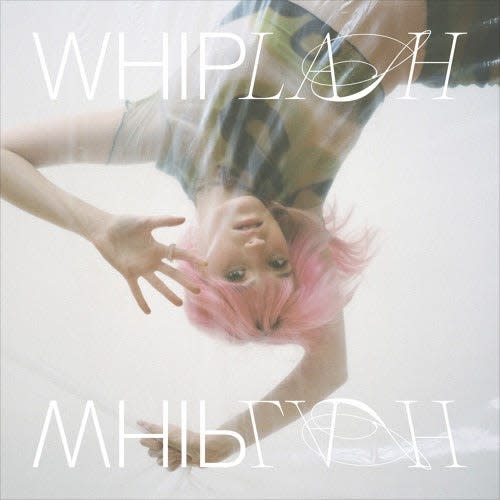
Struggling in a relationship? Consider her would-be breakup lines from "Like You": “We’re not gonna work out/Wish I could say that out loud … How can I like you if I don’t even like myself?” Or maybe her sleepy realization on “Forget You” that “I wish I didn’t need ya/You make me sick.” Or her dismissive aside to a lover who ghosted her and then resurfaced on the irregular-beat “How Very Dare You”: “It’s kinda pathetic, but whatever.”
Then there’s her complicated take from the billowy “Grenade”: “If I’m a grenade, I guess you’re the pin, holding me together till it all blows up.” And this resigned wisdom from “I Don’t Know How to Girlfriend”: “Everyone’s a mess, so let’s just be a train wreck, too.”
On a more positive note, Grae finds sweet appreciation for someone in “Spinning” and “Soft” and even engages in tentative flirtations on “Outta This World” (“Don’t like to chase, but I like your face … Keep me in your orbit.”)
Yet Grae’s best song is about her relationship with her former self on “Boxes,” where she hitches a humming rhythm and offers an infectious melody as she packs up and moves on from who she used to be: “I’m not that kid anymore.”
“Whiplash” is thoughtful and relatable … and even prompts a laugh now and then.
Grae
"Whiplash"
Rating: 4 (out of 5)
++++++++++
Band conjures unlikely ghost stories
Imagine a world where music genres don’t exist, and The Golden Glows are already there.
Although it may seem futile to describe the Belgian group’s new “On Moonlight and Rain” with labels, it at least hints at The Golden Glows sound to say the new release has elements of rock, folk, theater, Goth, jazz, cinema, ambient, Western, pop, spoken word, murder ballads, country and experimentalism.
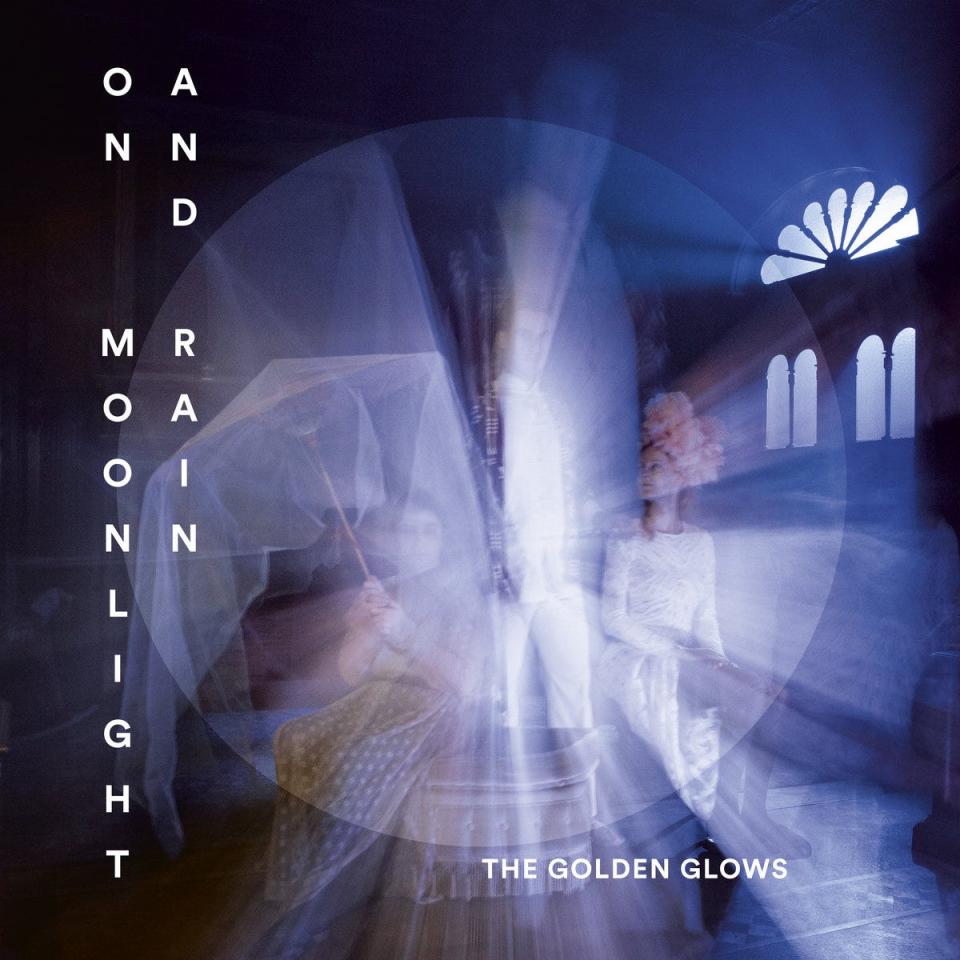
And the band’s instrumental lineup includes guitar, bass, drums, synthesizers, piano, marimba, lap steel, vibraphone, “electronics” and a couple of flutes – the kaval (traditional in Eastern Europe) and the ney (common in Middle Eastern music).
In addition, there are three vocalists who harmonize in off-kilter, spooky tones and take turns at lead.
Beyond all of that, a press release says the songs are based on supernatural stories by Japanese author Ueda Akinari, published in 1776. Because, why not?
The result is ominous and beguiling, an improbably cohesive escapade even as the chiming “The Carp of My Dreams” evokes a twisted children’s song before it gives way to the raucous drums and electricity of “Kibitsu” that in turn yields to the hypnotic danger of the sci-fi/Western strains of the resonant “A Serpent’s Lust” that segues into the unlikely blend of exotica and performance art that is “The Blue Hood.”
What’s remarkable is that the band makes what could have been a histrionic hodgepodge into an unusually rewarding adventure in lush and eerie soundscapes suitable for an otherworldly mental escape … or at least a soundtrack to an animated Tim Burton film.
The Golden Glows
"On Moonlight and Rain"
Rating: 4 (out of 5)
++++++++++
'Wild Service' isn't serving Kate Bush
U.K. icon Kate Bush is perhaps the most universally mis-compared artist in popular music history. It seems as if nearly every individualistic or offbeat woman artist (plus a fair number of men artists) who has emerged in the past four decades has been compared to Bush – even if they sound nothing like her.
So, it’s no surprise to hear U.K. artist Stacey Cohen get the Bush comparisons, too – especially given Cohen’s new “Wild Service” was produced by Jon Kelly, who co-produced Bush’s 1980 classic, “Never for Ever.”
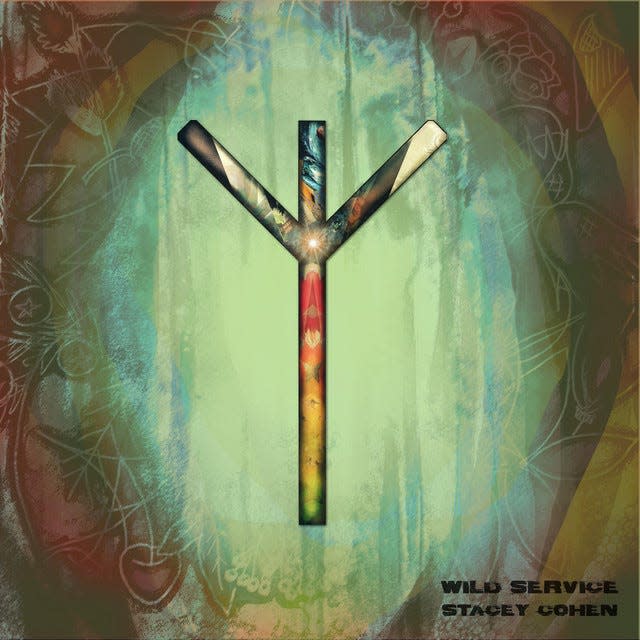
But it would be better to compare Cohen to Florence Welch (Florence + the Machine) or Polly Jean Harvey.
Or better still, Cohen could be compared to a ghost hanging out in your house, muttering and moaning lines in a deep voice with poor enunciation and a folk-adjacent style, employing found sounds and quirky electronics to bring to mind a slo-mo alien invasion in your attic on the sludgy “Night Vision” or an apparition tinkering with tools and plumbing in your kitchen during the ominous fidget of “Winter Socks.”
It’s all quite theatrical, periodically humorous and low-key engaging, at least for a while.
Plus “Wild Service” even periodically approximates a form of alternative pop and rock, as when keyboards offset the clanging of “Wild Swimming” or when a harmonica contrasts with the electric charge of the “Wild Service” title track. And there’s also the high drama of closing ballad “The Tower,” where Cohen conveys an air of doom to announce, “The tower has fallen; the ravens have all flown.”
In the end, Cohen doesn’t really compare well to anyone, which is a tribute to her creativity: She isn’t a modern Goth or post-punk. However, her “Wild Service” also never takes the form of a coherent sound, her shtick doesn’t always land and it’s all a great mystery, for better and worse.
Stacey Cohen
"Wild Service"
Rating: 3-1/2 (out of 5)
++++++++++
Chuck Campbell is a content strategist for Go Knoxville and Knox News
Go Knoxville FB | Email | 865-342-6443
Make our community, our society and our republic stronger by supporting robust local journalism. Subscribe today at knoxnews.com/subscribe.
This article originally appeared on Knoxville News Sentinel: New music reviews: Rammstein, Ann Wilson, Chelsea Jade, Moonalice, Grae

